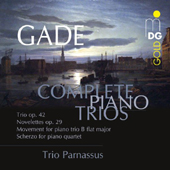
ESSENTIAL RECORDINGS

1- Trio in F major, Op. 42
2- First Movement of a Piano Trio in B flat major (1839)
3- Novelettes Op. 29
4- Discarded Finale to the Novelettes
5- Scherzo for Piano Quartet (1836)
As in their excellent previous recording of the Piano Trio works of Benjamin Godard, the Trio
Parnassus have once again peered beyond the outer layer of this unjustly neglected music,
and instead of perceiving only its face value, have unearthed its deeper substance and obviously elusive
beauty.
Born in Denmark, Niels Wilhelm Gade (1817-1890) was a prolific composer whose
works include eight symphonies, was organist for most of his life, conductor of the Leipzig
Gewandhaus Orchestra, friend to Schumann and Mendelssohn, teacher to Grieg and Nielsen, but yet
has always been confined to the darker backstage corners when it comes to performance or recordings
of his music. And this music, despite having been written within the strict guidelines and theoretical
rules of the 19th century, is certainly less pedantic and formulaic than Mendelssohn for example. Its
melodic invention distances it from the conventional.
And that is precisely what the Trio Parnassus, Yamei Yu (violin), Michael
Gross (cello), Chia Chou (piano) and Thomas Selditz (viola in the quartet) reveal in this traversal of his
chamber output for Piano Trio. In its emotional impetus, this music is a closer relative to Beethoven
for example, than to Mendelssohn or Dvorak who were Gade's contemporaries. Gade's firm grasp of
development and momentum, prevent his music from falling into the tedium of repetition like some
other composers of his generation. And the excellent musicianship of this ensemble enables them to
impose their own emotive perspective on this characterful music.
MDG have once again produced a must-have recording for chamber music fans,
especially those in search of something less familiar and worth adding to their collection. Had this
music been performed and aired on radio stations as often as the music of Schubert or Schumann,
it would now be considered just as important, and would certainly hold its place in musical history.
Don't let its lack of exposure fool you into passing it by.
Jean-Yves Duperron - March 2011